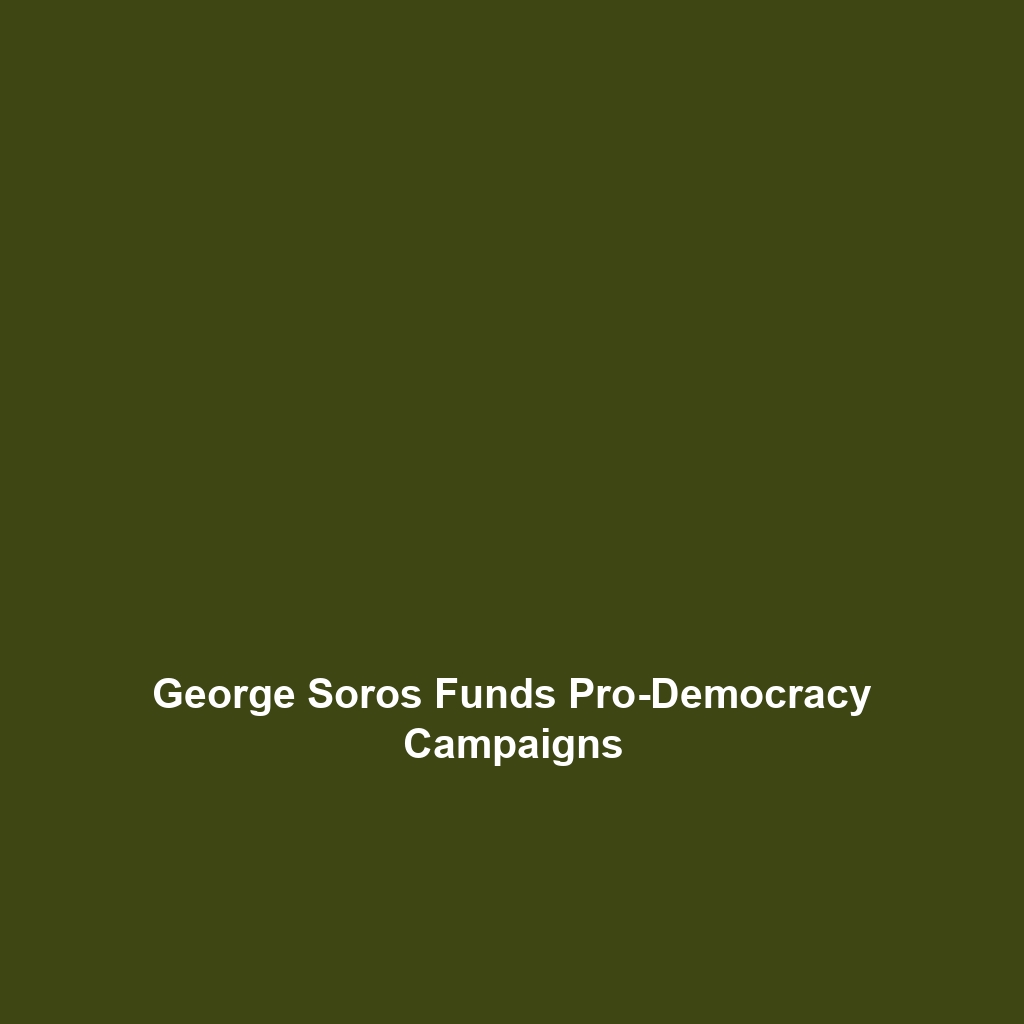Your cart is currently empty!
Tag: political engagement

George Soros Funds Pro-Democracy Campaigns
George Soros Funds Pro-Democracy Campaigns
George Soros Funds Pro-Democracy Campaigns
Philanthropist George Soros has announced a substantial commitment of $300 million aimed at bolstering pro-democracy initiatives worldwide. This funding is part of his longstanding mission to protect democratic processes and promote individual rights amid rising authoritarianism in various regions, including Eastern Europe, Africa, and Latin America.
Soros’s Commitment to Democracy
George Soros has been a key figure in promoting democratic governance and human rights since founding the Open Society Foundations in 1979. The recent $300 million allocation is intended to advance these goals, especially at a time when many democracies face significant challenges, including disinformation campaigns and political polarization.
According to BBC News, Soros’s funding will primarily focus on supporting grassroots organizations that promote political engagement, civic education, and efforts to combat corruption. “Strengthening democracy is a global priority,” Soros stated in a recent press release, emphasizing the need for increased support for democratic institutions under threat.
Areas of Focus
The funds are expected to target several key areas:
- Civic Engagement: Encouraging voter participation and public advocacy efforts to ensure that citizens’ voices are heard.
- Press Freedom: Supporting independent journalism and combating misinformation.
- Legal and Political Justice: Funding initiatives that promote equitable legal systems and offer support for activists facing persecution.
The Global Context
Globally, the state of democracy has been under significant stress. According to the Freedom House 2021 report, the number of countries classified as “free” has diminished, highlighting a trend towards authoritarianism. Soros’s funding comes at a pivotal moment, as many countries navigate the complexities of democratic governance in increasingly polarized environments.
Areas such as Eastern Europe have shown particular vulnerability to autocratic influences, with recent years seeing elections undermined and civil society groups facing repression. Soros’s initiative aims to provide those organizations with the resources necessary to campaign for transparent governance and civil liberties.
Reactions and Criticism
Soros’s philanthropic efforts have drawn both support and criticism throughout his career. Supporters laud his focus on civil liberties and activism, viewing his contributions as vital to maintaining democratic values. For instance, The Guardian highlights how grassroots organizations benefiting from his support have successfully mobilized to influence policy changes.
Conversely, critics argue that Soros’s funding can lead to political interference. Some see his initiatives as part of a broader agenda to influence political outcomes rather than facilitate organic, community-led movements. Right-wing factions in various countries often label Soros as a boogeyman, alleging that his financial support advances a liberal agenda.
Conclusion: A Call to Action
As part of the global pro-democracy movement, George Soros’s latest funding initiative represents not just financial support but also a call to action for advocates of democratic principles. As the world grapples with the implications of rising authoritarianism, his efforts signal an ongoing commitment to strengthen democratic institutions and values.
In conclusion, the allocation of $300 million to pro-democracy campaigns highlights an urgent need for robust activism in defense of democratic ideals. Observers and analysts will be closely monitoring how these funds are utilized and the impact they generate on a global scale. Potential beneficiaries and other philanthropic entities are motivated to join this effort to ensure that democracy remains resilient in the face of adversity.

Elon Musk’s Political Influence
Elon Musk’s Political Influence
Elon Musk’s Political Influence
Elon Musk, the billionaire CEO of Tesla and SpaceX, has increasingly become a significant figure in U.S. politics, especially through his financial support of political campaigns. His investments in Donald Trump’s political activities have not only fueled Tesla’s growth but have also expanded Musk’s political clout, allowing him to shape disruptive technologies that align closely with governmental interests.
Musk’s Financial Contributions
In recent years, Musk has demonstrated a willingness to invest heavily in political campaigns, with notable financial contributions to Donald Trump’s political endeavors. According to public finance documents from the Federal Election Commission, Musk’s support marked a significant alignment with Trump’s policies, particularly in areas surrounding innovation, energy, and transportation infrastructure.
Musk’s decision to support Trump reflects a strategic calculated move that benefits both his companies and his personal brand. According to Dr. Alison Dagnes, a political science professor at Shippensburg University, “Musk’s contributions suggest a focus on gaining access to power and influence, which may provide favorable conditions for Tesla’s operations and growth.” These contributions have also raised eyebrows in political circles, sparking debate about the ethical implications of corporate endorsements in politics.
Tesla and Government Contracts
One of the pivotal aspects of Musk’s political strategy is securing government contracts. As the U.S. government invests heavily in renewable energy and electric vehicles, Tesla’s expansion has coincided with federal policies that encourage green technology advancements. The Biden Administration’s focus on combating climate change has opened new avenues for Tesla, which can be partially attributed to Musk’s cultivated relationships in political spheres.
In a recent report by the International Energy Agency, electric vehicle sales in the U.S. surged, representing a coordinated effort from both the government and private sector to advance sustainability. Musk’s political contributions have positioned Tesla as a key player in this transformation, thereby enhancing the company’s market dominance.
Political Engagement Beyond Contributions
Musk’s influence extends beyond financial backing. He has engaged directly in various political discussions, leveraging social media platforms to amplify his views and support for government initiatives aligned with his company’s goals. For instance, Musk’s advocacy for favorable regulations surrounding autonomous driving technologies has prompted discussions within legislative bodies, further indicating the interplay between his business interests and political engagement.
Experts note that Musk’s social media presence often influences public discourse and political opinion. Dr. Julia Azari, a political scientist at Marquette University, states, “Musk’s ability to sway narratives through social media can mobilize public opinion, which can inadvertently pressure politicians to align with the interests of Tesla and related technologies.” This dynamic underlines the increasing role of technology leaders in shaping policy initiatives.
Criticism and Controversy
Despite his successes, Musk’s political activities have attracted criticism. Opponents argue that his financial contributions create an unequal playing field, leading to potential conflicts of interest. Concerns have been raised regarding the extent to which corporate money can influence public policy, particularly when it aligns directly with business interests.
Several watchdog organizations, including Public Citizen, advocate for stricter regulations on campaign financing to diminish the impact of big money in politics. They assert that Musk’s influence exemplifies a broader problem in the political landscape, where billionaires leverage their wealth to sway government actions.
The Future of Musk’s Political Influence
As Musk continues to deepen his involvement in U.S. politics, his support mechanisms are expected to evolve. With the upcoming election cycle on the horizon, his role as a political financier will likely intensify, potentially affecting both local and national elections. Political analysts suggest that Tesla’s fortunes may further intertwine with Musk’s political engagements as he continues to advocate for policies advantageous to his business ventures.
Many industry insiders believe that Musk will maintain a focus on strategic partnerships with political figures who support technological innovation. As we approach a pivotal moment in U.S. politics, Musk’s financial influence and corporate growth will be key factors in shaping the policy landscape, particularly in renewable energy and transportation sectors.
Conclusion
Elon Musk’s political influence, defined by strategic financial contributions and direct engagement in political discourse, is a significant factor in both Tesla’s success and broader technological advancements in the U.S. While his actions spark debate about the influence of wealth in politics, they also underscore the evolving relationship between tech giants and government. The implications of Musk’s political strategies foreshadow a continuing interplay between corporate aspirations and national policies, raising questions about the future of innovation amid competing interests.